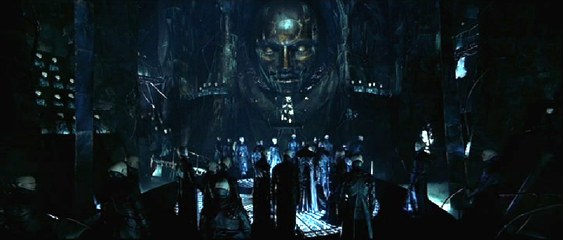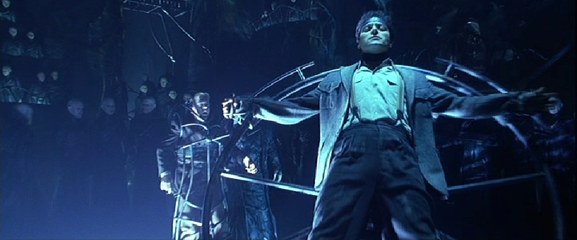|
Two thumbs enthusiastically raised for this
astounding visual masterpiece. Scoop's comments in white: Helluva movie! Very few films are capable of creating an entirely different world in which humanity may dwell. When such movies come along, works of imagination like Fritz Lang's Metropolis, we tend to form cults around them and we never forget having seen them. There were three great ones in the 1980's, Terry Gilliam's Brazil, Ridley Scott's Blade Runner, and Tim Burton's Batman, and then the well went dry for about a decade until, in the dying embers of the previous millennium, there were two formidable new entries into this arena: Jean-Pierre Jeunet's City of Lost Children (1995), and Alex Proyas's Dark City (1998). Dark City features a mini-world in which humans think they are in charge, but in fact are just stuck in the experiments of another race, like rats in a very complicated maze. The Strangers are a dying race who can alter time and space through sheer will, but cannot figure out how to keep their race from dying out. In fact, they are melding into a single group consciousness, and losing all sense of individuality. They admire the liveliness and passion of humans, and are trying to determine how to incorporate human emotions, joy, and individuality into their own race. They change the entire world every night at midnight, when they stop time and humans sleep. If you erase a mass murderer's consciousness and give him Albert Schweitzer's memories, will he become a philanthropist, or will something in his genetic composition steer him back to murder? And what about our surroundings? If you change them, do you change us? Probably, but if so, how much? We really don't know the answer to these questions, and ultimately that's what The Strangers think they need to know if they are to understand individualism. Rufus Sewell, who appears despite all evidence to the contrary NOT to be Joachim Phoenix, plays the part of a murderer who awakens in his bathtub. At least he thinks he might be a murderer. Some people think he is, but he doesn't remember anything about anything. In fact, nobody in town seems to really know much about anything. They aren't sure how to find other parts of town, or the towns they grew up in. Oh, yeah, and nobody can remember the last time they saw daylight, but they don't seem to worry about it. Life isn't always fair, and success in the film industry is sometimes the most unfair of all life's elements. If this movie had been a major success on the level of The Matrix, which it resembles in many ways, Rufus Sewell would now be a major star. It wasn't, and he isn't. In 1998 he was in at least three meritorious movies (Dark City, Illuminata, Dangerous Beauty, and two others I haven't seen). In 2002 his only theatrical release was Extreme Ops, a dreadful schlockfest about international war crimes and snowboarding. |
|
|


